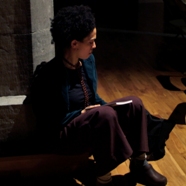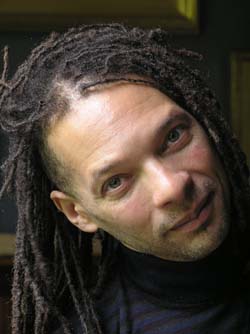

| |
|||
Black Performance Theory 2011: |
|||
Confirmed Participants: |
|||
 |
Stephanie
Batiste is Associate Professor in the Departments of Black Studies & English, in the Schools of Social Sciences and the Humanities. Dr. Batiste obtained her Bachelor’s Cum Laude from Princeton University. She received her Master’s of Philosophy and Doctorate of Philosophy in American Studies from The George Washington University in Washington, District of Columbia. Dr. Batiste’s interests include the relationships between representation, performance, identity, race, and power. Her research and teaching focus on the ways in which cultural texts, like literature, theater, performance, film, art, and bodies, as imaginative systems themselves create identity, cultural values, human interactions, and possibilities of justice. Her teaching reflects this in the broad array of materials she uses to bring students to an interdisciplinary understanding of texts, theory, and history. Her book, Darkening Mirrors: Imperial Representation in Depression Era African American Performance, forthcoming from Duke University Press, examines the complicated ways African Americans participated in American ideologies of cultural imperialism—ideologies like expansionism and primitivism. It explores how a population alienated from national power defined a national identity and imagined themselves as empowered citizens and transnational actors. Dr. Batiste’s interest in performance is reflected in both scholarship and practice. She sees performance practice as a mode of making theory. She writes, performs in, and, on occasion, directs dramatic works. She has performed in community- and professional theaters and participated in special programs at both. |
||
 |
Annemarie Bean is an independent scholar living and raising her children Elsa and Tobias in Vermont. She is currently a proud English Language Arts and theatre high school teacher at the Berkshire Arts & Technology Charter Public School in Adams, MA, having made a career change from teaching theatre, American Studies and African American Studies Programs on the college level at Williams College, Wesleyan University and Marlboro College. Along with Sandra L. Burton, Bean organized Stalwart Originality, an annual conference at Williams that celebrated African American performance. Bean’s specialization areas are in performance studies and intercultural performance, with a particular concentration on performances of race and gender in American theatre and performance. She is the co-editor, along with James V. Hatch and Brooks McNamara, of Inside the Minstrel Mask: Readings in Nineteenth-Century Blackface Minstrelsy, published by Wesleyan University Press in 1996 and winner of the 1997 Errol Hill Award, given for outstanding scholarship in African American theatre studies by the American Society for Theatre Research. Professor Bean is also the editor of A Sourcebook on African-American Performance: Plays, People, Movements, published by Routledge in 1999. Recently, Bean has returned to directing, and staged Sarah Ruhl’s A Clean House in the fall of 2010 at Marlboro College. |
||
 |
Melissa Blanco Dr. Blanco Borelli joined the Dance, Film and Theatre department at the University of Surrey in the fall of 2008. Previously, she was a Martin Luther King Jr. Visiting Scholar in the Music and Theatre Arts department at the Massachusetts Institute of Technology (with Thomas DeFrantz). She has also taught at UCLA, UC Riverside and Citrus College. She holds a PhD in Dance History and Theory (now Critical Dance Studies) from the University of California, Riverside (dissertation supervised by Anna Beatrice Scott), an MA in Communications Management from the University of Southern California, and a BA in Music and International Relations from Brown University. Her monograph in progress, She is Cuba: A Genealogy of Mulata Corporeality traces the history of the mulata in Cuba through social dance histories from the nineteenth century to now. She is also the editor of The Oxford Handbook on Popular Screen Dance which examines dance, identity and corporeality in film, television, music videos, commercials, and other screens. As a dance practitioner, she has taught and performed Afro-Cuban sacred and popular dance in Los Angeles, New York, London, Boston and Havana, Cuba. She has performed her cabaret spectacle, Mulata Madness (based on her research and the cabaretera films of Mexico's Golden Age) in Boston, Havana and London. Lastly, she is also writing a performance and film project on sixteenth century Spanish mulata hermaphrodite Elena/o de Cespedes. | ||
 |
Rashida Braggs (Ph.D Northwestern University, M.S. Boston University, B.A. Yale University) is a post-doctoral fellow at Stanford University; she will be starting as assistant professor at Williams College in Africana Studies in the fall. Currently, Rashida is writing her manuscript entitled Jazz Diasporas: Race, Music & Exile in Post-WWII Paris, which analyzes music, literature, film, historical documents and ethnographic interviews to explore experiences of African American exile in post-WWII Paris. Rashida’s manuscript project is just one aspect of her larger interest in international scholarship and pedagogy. Over the years, she has interned in England, studied in France, and taught in Vietnam and Germany. Rashida has published in Nottingham French Studies and the Journal of Popular Music. She enjoys putting performance to practice as well by acting, writing, slamming poetry, and singing. | ||
 |
Jayna Brown researches performance and culture in the U.S. and elsewhere in the Diaspora, with a focus on vernacular expressive forms and the body. Her book, Babylon Girls: Black Women Performers and the Modern Body, is published by Duke University Press. She has also published on African American race film and the black filmmaker Oscar Micheaux. She earned her Ph.D. at Yale University's African American Studies Department, and she has been awarded dissertation and postdoctoral Ford Foundation Fellowships as well as a Rockefeller Award for the Study of Black Culture at the Stanford Humanities Center. Her two current projects are a series of essays on race, technology and utopias in speculative fiction and global pop music, and another project on black women and post punk music in Britain. Her classes at University of California at Riverside include: African American Women Intellectuals and Artists, Race and Performance and African American Literature. | ||
 |
N. Fadeke Castor (PhD Cultural Anthropology, University of Chicago) is currently Assistant Professor of Africana Studies and Anthropology at Texas A&M University where she works on issues of decolonization, citizenship, identity and representation in popular/public culture, new media technology, and performance throughout the African Diaspora, specifically in the Anglophone Caribbean. Currently, she is working on a book manuscript, "Masking the Middle Class: Performance and the Decolonization of Blackness" which argues that in black liberation and African-centered religious middle class communities Trinidadian performances negotiate identities and engage in processes of decolonization by redefining inherited conceptions of blackness and Africanness. | ||
 |
Sarah Jane Cervenak (M.A, PhD, New York University) is an assistant professor, jointly appointed in the Women’s and Gender Studies and African American Studies programs at the University of North Carolina, Greensboro. She teaches introductory and advanced seminars on the politics of race, gender, sexuality, and performance. Her current theoretical and political inquiries concern notions of privacy and the resistance to the empirical gaze, as expressed in the literatures of Adrienne Kennedy and Gayl Jones. Both artists produce work that is either figured as psychotic or 'aggressively digressive'; their Black female characters often ramble and daydream their relation to the world, a move which upsets critics who seek 'plot', 'direction', 'meaning'. This resistance to the plot is a way that Black women resist capture and the kinds of reductions at work in other people's teleological understandings of identity. This work is from a larger book project, Wandering: Between Performance and Philosophy [solicited by Duke University Press], which is interested in the ways that wandering at once describes the condition of possibility of Racialized, Gendered Enlightenment and Anti-Enlightenment. Her scholarship has been published in anthologies situated in feminist theory and African American Studies, and has appeared in peer-reviewed journals. |
||
 |
Grisha Coleman, native of New York City, works as a composer, performer and choreographer. She recently joined the faculty in the School of Arts, Media and Engineering at Arizona State University (ASU) as professor of movement, computation and digital media. [http://ame.asu.edu/] Preceding this, she spent three years as a research fellow/artist-in-residence at Carnegie Mellon University's Studio For Creative Inquiry. She spent a year as Course Director for the MA Degree in Contemporary Dance and Performance at the Irish World Academy of Music and Dance in Limerick, Ireland. Coleman is a graduate of the College of Letters at Wesleyan University, and holds an MFA in Composition and Integrated Media from California Institute of the Arts. Coleman danced as a member of acclaimed dance company Urban Bush Women for four years. Following this, she created the music performance group HOTMOUTH which toured extensively nationally and internationally and was nominated for a 1998 Drama Desk Award for "Most Unique Theatrical Experience". For the development of her current work, echo::system [www.echo-system.org], Ms. Coleman works with a collaborative team of artists, technologists and researchers, having developed and presented work at a variety of diverse residencies and venues including: the Banff New Media Institute [Canada], the Beall Center for Art and Technology at UC Irvine [CA], Eyebeam Centre for Art and Technology [NY], and New World Theater at Amherst University among others. Other recent work includes a commission from the Carnegie Mellon Robotics Institute for a public, site-specific robot in Pittsburgh's Robot 250 Festival. "Reach, Robot" was installed as a public sound sculpture, a visual/kinetic installation and a domain for public interaction and participation. Highlighted awards and honors include: Rockefeller Multi-Arts Production (MAP), The Creative Capital Foundation, The Jerome Foundation, and the New York Foundation Artists' Fellowship (NYFA), Yaddo Artists Residency. She has worked with a variety of sublime artists including: Rennie Harris, Oliver Lake, Ntozake Shange, Jonathan Stone, Erik Ehn, Laurie Carlos, Butch Morris, Gherri Allen, Pauline Oliveros, Dr. Ysaye M. Barnwell (Sweet Honey in the Rock), Anne Le Baron, David Rousseve, Nora Chipamure as well as filmmakers Julie Dash and Spike Lee. | ||
 |
Yolanda Covington-Ward (BA Brown University, MA University of Michigan, Coursework in the Graduate Program in Performance Studies) received her Ph.D in Cultural Anthropology from the University of Michigan. She is currently an Assistant Professor in the Department of Africana Studies at the University of Pittsburgh. Covington-Ward’s research looks at the various ways in which the body is used to transform social relationships and individual and group identities—from the impact of Black girls’ games on gender identity in the Bronx, to trembling being used to challenge colonial authority in the Belgian Congo, to dances that shape Liberian national identity. She has previously published in Women and Performance: A Journal of Feminist Theory, Transforming Anthropology, African Research and Documentation, and The Journal of Religion in Africa. She also has a forthcoming article on performances of Kongo nationalism in The Journal of Black Studies. Yolanda is currently working on revising her manuscript, Gesture and Power: Everyday Performances and Authority in the Congo, for publication as a monograph. She also recently developed a new course called “Power and Performance in Africa.” Yolanda danced for two years (2001-2003) with Bichini Bia Congo, a Congolese dance company in Ann Arbor, MI before leaving to conduct ethnographic research in the Democratic Republic of Congo. | ||
 |
Antonio C. Cuyler, Ph.D. Florida State University, has had a diverse career in the arts that integrates management, performance, research, and teaching. He recently joined the faculty at Purchase College SUNY as Assistant Professor of Arts Management where he teaches undergraduates pursuing careers in the arts & entertainment industry. One of his research prfojects focuses on the management of culturally-specific arts organizations who present and produce works reflective of Black Performance Theory. He is also writing a book based on his dissertation entitled "Tales from beyond the glass ceiling: The careers of executive opera administrators of color in the United States." Before entering the academy, Cuyler enjoyed considerable success as a performer of opera, musical theatre, oratorio, Negro spirituals, and gospel. | ||
 |
Thomas F. DeFrantz earned degrees from Yale, City University of New York, and NYU, and has taught at NYU, Stanford, and MIT where he is Associate Professor of Music and Theater Arts. His research centers on African American performance. As a performer: Morton Gould Tap Concerto with the Boston Pops conducted by Keith Lockhart; Duke Ellington Tap Concerto with the Aardvark Jazz Orchestra led by Mark Harvey. As a director and writer: affiliations with the Drama League of New York, the Theater Offensive of Boston, and the performance research group Slippage: Performance Interventions in Culture and Technology, in residence at MIT. Recent original plays: Queer Theory! A Musical Travesty, an National Performance Network project commissioned by the Flynn Center for the Arts and the Theater Offensive; The Downright Sexy Adventures of Drew Durango, written with composer Michael Wartofsky for New York cabaret star Darius de Haas; Ennobling Nonna, produced at MIT; and Monk’s Mood: A Performance Meditation on the Life and Music of Thelonious Monk. Publications include Dancing Many Drums: Excavations in African American Dance (University of Wisconsin Press) and Dancing Revelations: Alvin Ailey's Embodiment of African American Culture (Oxford University Press). Served on the boards for the Society of Dance History Scholars and as Book Editor for the Dance Critics Association. For many years he organized the dance history program at the Alvin Ailey School in New York. Core faculty, American Dance Festival/Hollins University MFA Program. Current Research: Black Beauty: Concert Dance in the Africanist Grain. Current Performance Project: CANE: A Responsive Environment Dancework, based on Jean Toomer's novel. | ||
 |
Nadine George Graves (PhD, Northwestern). PhD Faculty UCSD. George-Grave's work is situated at the intersection of African American studies, feminist studies, theatre history, and dance history. She is the author of The Royalty of Negro Vaudeville: The Whitman Sisters and the Negotiation of Race, Gender, and Class in African American Theater, 1900-1940 (New York: St. Martinís, 2000) and is already well into her second book, Urban Bush Women and Postmodern Black Performance. In addition to her impressive scholarship, Nadine has written four plays and a screenplay. She also has extensive experience and training as an actor, director, dancer, and choreographer. | ||
 |
Anita Gonzalez (Ph.D. 1997 University of Wisconsin-Madison) is an Associate Professor and Associate Chair in Theater Arts at the State University of New York – New Paltz where she teaches directing, movement, and theater history courses. She is the author of the book Jarocho’s Soul: Cultural Identity and Afro-Mexican Dance, and the forthcoming Afro-Mexico: Dancing Between Myth and Reality Her articles about performance appear in Radical History Review, Modern Drama, Dance Research Journal, Journal of Dramatic Theory and Criticism, and Women and Performance and her essays appear in Community Performance Reader and Latinas On Stage. Anita has served on the Board, and the Programming Committee of the Society of Dance History Scholars. She is an associate member of the Society of Stage Directors and Choreographers. Gonzalez has been an artist-in-residence at Rockefeller’s Bellagio Center, and has won multiple awards for theater production and research including three Fulbright Senior Scholar Awards. | ||
 |
E. Patrick Johnson is Professor, Chair, and Director of Graduate Studies in the Department of Performance Studies and Professor in the Department of African American Studies at Northwestern University. He is the author of Appropriating Blackness: Performance and the Politics of Authenticity (Duke, 2003), Sweet Tea: Black Gay Men of the South—An Oral History (UNC, 2008), and co-author (with Mae G. Henderson) of Black Queer Studies: A Critical Anthology (Duke, 2005). He is touring a one-man show based on the narratives in Sweet Tea. | ||
 |
|
||
 |
Christina McMahon is an assistant professor of theatre at UCSB, where she teaches class on African and Caribbean theatre, as well as Race and Gender in American performance. Her current research draws on theories of global circulation to analyze transformative performances of colonial history, race, gender, and sexuality within theatre festival productions, specifically those staged for Portuguese-language festivals on the Cape Verde Islands, in Mozambique, and Brazil. Broadly, her research interests encompass Lusophone postcolonialism, performance-based ethnography, globalism and national identity formation in Africa, and theatrical strategies employed during wars of liberation on the African continent in the twentieth century. She is the recipient of a Fulbright-Hays Doctoral Dissertation Research Abroad grant, a Mellon travel grant, the American Society for Theatre Research Dissertation Award (2005), and the IFTR New Scholar?s Prize (2007). Her articles have appeared in Theatre Survey, Theatre Research International, Theatre History Studies, and the Latin American Theatre Review. She received her doctorate from Northwestern University's Interdisciplinary Program in Theatre and Drama. |
||
 |
Uri McMillan (PhD, Yale University) is an Assistant Professor of English and African-American Studies at the University of California, Los Angeles. He teaches courses in black cultural studies, queer literatures and theories, and performance cultures. His research interests include feminist performance art, contemporary black diasporic art, visual culture, feminist theory, and nineteenth and twentieth century black performance. He is presently working on his book manuscript, which is a study of the specific performance-based techniques deployed by black women to stage themselves and counterfeit identities in discrete theatrical sites as well as the quotidian spaces of everyday life in the nineteenth and twentieth centuries. | ||
 |
Koritha Mitchell (PhD, University of Maryland-College Park) specializes in African American literature, racial violence throughout U.S. literature and culture, and black drama & performance. She examines how texts, both written and performed, have helped terrorized families and communities survive and thrive. She is author of Living with Lynching: African American Lynching Plays, Performance, and Citizenship, 1890 -1930 (University of Illinois Press, October 2011). Mitchell is equally interested in examining the impact that racial violence has had on artists who work in forms other than drama. For example, see her article “Mamie Bradley’s Unbearable Burden: Sexual and Aesthetic Politics in Bebe Moore Campbell’s Your Blues Ain’t Like Mine” in CALLALOO. While examining a novel prompted by Emmett Till's murder, this essay builds on traditions of black feminist criticism to begin explicating what Mitchell calls “homebuilding anxiety,” a concept that will animate some of her future work. Mitchell's research has been supported by the Ford Foundation and the AAUW, and she is currently assistant professor of English at Ohio State University. | ||
 |
Raquel Monroe (Ph.D., UCLA) is an Assist ant Professor in Dance at Columbia College Chicago. Her research interests include, the performance and representations of black female sexualities, the intersection between social mobility and activism in black communities, performance ethnography, and dance pedagogy. She is currently preparing an article for a special edition on African/Black dance for the Journal of Pan African Studies where she interrogates the location of Africanist dance aesthetics and practices in university and college dance programs. Her chapter, “The White Girl in the Middle:” The Performativity of Race, Class, and Gender in Step Up 2: The Streets, will appear in Melissa Blanco’s (University of Surrey) forthcoming edited volume, Mediated Moves: A Popular Screen Dance Reader. Raquel is also an interdisciplinary artist whose performance work explores notions of activism, family narratives, and grief and loss. | ||
 |
Monica White Ndounou (PhD The Ohio State University) Assistant Professor of Drama and affiliate faculty in American Studies, Africa and the New World, Women's Studies, International Literature and Visual Studies and the Communications and Media Studies programs. Her interdisciplinary research projects span a broad range of topics featured in her articles and current book projects. The Cultural Politics of Hollywood: Adapting to Color-coded Economics and the Future of African American Film identifies the intersection of race, culture and economics as the critical site for determining the future of African American film. She is also working on a book-length study on The Power and Paradox of Acting for Black Americans which focuses on Black actors and actresses' contributions to developing acting theories and practices, especially in regards to potentially traumatic effects of acting processes and related circumstances. Recent publications also include "The Paradox of Acting for an African American Actress" (2006) and "Encountering Black Culture in Acting Classrooms and Beyond" (2009). She has presented her research at several national and international conferences and she also directed several stage productions including Ntozake Shange's for colored girls who have considered suicide/when the rainbow is enuf at Tufts University in Spring 2010. |
||
 |
Omi Osun Olomo/Joni L. Jones is the Director of The John L. Warfield Center for African and African American Studies and Associate Professor of Performance Studies in the Department of Theatre and Dance at the University of Texas at Austin. She is an artist/scholar who is currently engaged in performance ethnography around the Yoruba deity Osun, and is writing a collaborative ethnography on the use of a jazz aesthetic in theatre. While on a Fulbright Fellowship in Nigeria (1997-98), Dr. Jones taught at Obafemi Awolowo University and contributed Theatre for Social Change workshops for the Forum on Governance and Democracy in Ile-Ife. Her articles on performance and identity have appeared in Text and Performance Quarterly, The Drama Review, Theatre Topics, Theatre Journal, and Black Theatre News. She is the founder of The Austin Project—a collaboration of women of color artists, scholars, and activists who use art for re-imagining society. Her performance ethnography includes Searching for Osun, sista docta, and Broken Circles: A Journey Through Africa and the Self. |
||
 |
Venus
Opal Reese BFA, MA, MFA, Ph.D., is
an award winning solo performer, playwright, director, choreographer and poet. She
is a scholar/performing artist who has performed nationally
and internationally for over 20 years. Her latest solo performance
work, Split End, a piece about Black women and hair, was featured
on the cover of the Palo Alto Weekly, showcased at the Black
Repertory Theatre in Rhode Island and ran off-Broadway at La MaMa ETC.
Split Ends was nominated for an AUDELCO Award. Dr. Reese was
recently featured on ABC News and in Glamour Magazine
and Diversity Inc., as an expert on race, beauty, and culture.
Her performance with the Hip-Hop theatre play, Will Power’s The
Seven, was featured in the American Theatre Magazine
and won 3 Critic Choice Awards.
Dr. Reese has presented and performed internationally at the Sorbonne,
Paris, France under the auspices of the W.E.B. Dubois Institute at
Harvard University, La MaMa Umbria International, Spoleto, Italy, and
Universita di Padova, Padova, Italy. Most recently, she presented her
performative work in Mexico City, Mexico for the Office of International
Society for Cultural History and Cultural Studies (CHiCS).
Nationally she has performed and directed with such establishments
as MIT, Cultural Odyssey, AfroSolo, the LA Women’s Festival,
and the Hip-Hop Theatre Festival, NYC. Locally, in Dallas, TX, she
has performed performance poetry works with Word Space and performed
excerpts of works with Laughing Tongues at Undermain Theatre, Backbeat
Café, and South Dallas Cultural Center.
As a scholar, Dr. Reese’s research links Africa, the Middle
Passage, Antebellum Slavery, minstrelsy and popular culture through
the stories we tell. She offers and designs courses in Spoken Word,
Arts and Performance, Theatre, Movement Theatre, African Dance, Hip-Hop
Dance, American Character, Acting, Performativity, Cultural Studies,
Womanism/Feminism, Queer Theory, Literary Theory, and Critical Race
Theory. She speaks, consults and trains in the area of identity formation
through language by combining her performance background with her academic
training. Dr. Reese has a BFA from Adelphi University; an MFA from
Ohio State University in Acting and Movement Theatre, with an emphasis
on choreography and mime; an MA in drama, and a Ph.D. in Directing,
Performance Theory/Literary Criticism, both from Stanford University.
Dr. Reese’s scholarly performative writing has been published
in the Women and Performance journal, the Journal for
Global Transformation, and edited volumes like Recharting
the Black Atlantic: Modern Cultures, Local Communities, Global
Connections and The Politics of American Actor Training, both
with Routledge. Her forthcoming publications in 2011 are: “Queering
August: Exploring the Absent Potential of Homosexuality in Wilson’s
Cycle of Plays about the African American Experience,” in Black
Performance Theory, for Duke University Press, “Ah hah!
Moments: Personal Notes on Culture, Identity, and Pedagogy from a Feminist
and a Womanist,” Journal of Women's Intercultural Leadership, and
excerpts from her performative text, “…seduced: an intimate
dialogue about race,” for Testimonial Texts: Stories, Lives and Memories for
Enkidu Magazine. She has trade and popular publications as well
the most noted being her brand and product-line, Street Smarts:
Surviving Threat and Creating New Realities in Your Work and in Your
Life.
Dr. Reese collaborates with, directs, and produces artists such as
Tim’m West, Rhodessa Jones Dr. Tommy DeFrantz, and Akin Babtunde
in new works through her residency program, Performance Innovation
residency (PIr.) Presently, she is a tenured professor of Aesthetic
Studies at the University of Texas at Dallas, which also hosts PIr.
|
||
 |
Matt Richardson is a writer, scholar, and performer. He is an Assistant Professor in the Departments of English and African and African Diaspora Studies with affiliations in the Center for African and African American Studies and the Center for Gender and Women’s Studies at the University of Texas at Austin. Some of Matt’s most recent publications include, a co-authored article with Enoch Page, “On the Fear of Small Numbers: A 21st Century Prolegomenon of the U. S. Black Transgender Experience,” in the anthology,/Black Sexualities: Probing Powers, Passions, Practices, and Policies/, NJ: Rutgers University Press, 2009.He has an upcoming article in the Summer 2011 issue of /Black Camera/ on historiography and Cheryl Dunye’s /Watermelon Woman/. He is also a co-editor of the special issue of /Feminist Studies, /Race and Trans Theory, which is forthcoming in Summer 2011. Matt has been performing around the country since 1991. Recently, he was a co-founder of Nappy Grooves, a Black drag/gender performance troupe based in Oakland, California from 2003-2006 which were artists-in-residence at MIT in 2007. In addition to performing in various venues in Austin, he has co-directed two plays locally: /The Walls Are Alive (with the sound of)/ with Jen Margulies in 2008 and /The Majestic/ with Ana Lara in 2009." | ||
 |
Anna B. Scott Anna Beatrice Scott, Ph.D. is The Master Conduit at the arts and action consultancy, Vita Vibrare, where thinking is done at a higher frequency An Arts in Action agitator, Vita Vibrare provides strategy, programs and user/engagement studies & analysis at the nexus of traditional and new media to support "glocally" minded change makers with innovative story making tools. Scott has worked in arts management, production, performance, research and education since the late 1980s. She has worked as a stage hand, in a sound crew, as a stage manager, as event producer, managing director, marketing director, oral/corporeal history collector in Brazil, as well as performed as a dancer with groups as varied as Steve Coleman & The Five Elements and Chama Cia. da Dança in locales as varied as a 40-foot proscenium stage and 100 sq. foot parking lot. Anna performs conjurations with dance, digital devices and text on stage, in blogs, books and through strategic marketing plans. Her newest work SACKED, was presented at REDCAT Fall Studio program. Recent collaborative performance/productions found her performing in the Texterritory cell phone dance theater platform designed and implemented by Sheron Wray & Fleta Seigel (http://www.texterritory.com). As a performance scholar/instigator, Scott has presented her solo work at college campuses, galleries and street corners around the USA and in Salvador, Bahia-Brazil. She provided nine years of service to University of California, Riverside as an assistant professor of Dance History Theory. Her research specializes in the study, analysis, and performance of African Diaspora dance arts. Her new book, A Fala Que Faz/Words That Work, is a ten year study of the performance of ‘black’ as a political project in Bahia, Brazil and was released in 2010 by VDM. Change your mind, change the world. Vita Vibrare, thinking with a higher frequency http://www.vitavibrare.com |
||
 |
Harvey
Young is Associate Professor of Theatre
at Northwestern University, where he holds appointments in African-American
Studies, Performance Studies, and Radio/Television/Film. He is the author
of Embodying Black
Experience: Stillness, Critical Memory, and the Black Body (U Michigan,
2010) and the coeditor (with Ramón Rivera-Servera) of Performance
in the Borderlands (Palgrave Macmillan, 2011). Currently, he is editing
The Cambridge Companion to African American Theatre (Cambridge University
Press) and coediting (with Rebecca Rugg) 21st Century Neighbors, a play
anthology featuring new plays by Branden Jacobs-Jenkins, Robert O’Hara,
Gloria Bond Clunie, and Bruce Norris. Young is Vice President for Research
and Publications of the Association for Theatre in Higher Education (ATHE)
and Director of the Interdisciplinary Ph.D. in Theatre and Drama program
at Northwestern. |
||
 |
Hershini Bhana Young s Associate Professor at Suny at Buffalo where she teaches classes on gender, sexuality, race and performance. Her first book, Haunting Capital: Memory, Text and the Black Diasporic Body (UPNE) examines the injured body in literature and art of the African diaspora. She is currently finishing her second book project, Coercive Performances that uses historical women and their fictional representations to examine the nexus of coercion and consent. Looking at women like Saartjie Baartman, Tryntjie of Madagascar and the contestants of Ms. Angola Landmine, she shows how the meaning of consent is placed under crisis by the performances of women living within the context of slavery, colonialism and racism. Her latest article on Danzy Senna's Symptomatic is forthcoming in African American Review. | ||
| Other attendees are encouraged to inquire or attend using their own resources. |
|||